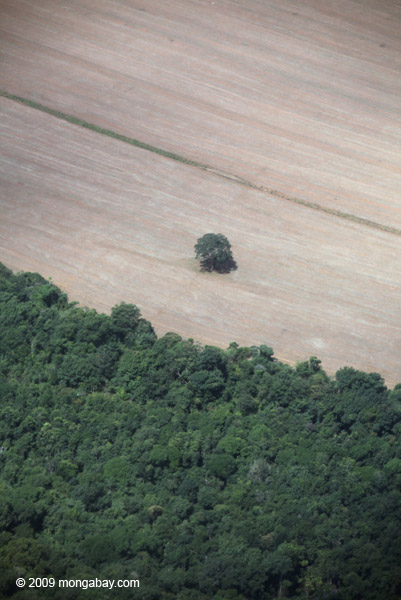
A Malagasy girl. While Madagascar faces widespread deforestation and erosion, it is estimated that 70 percent of its people suffer from malnutrition. The Rio+20 Summit is attempting to tackle both environmental degradation and poverty, but civil groups say the agreement falls far short of what is needed. Photo by: Rhett A. Butler.
As world leaders head to Rio de Janeiro for the UN Summit on Sustainable Development, environmental and poverty groups are denouncing the last-minute text agreed on by dignitaries as “pathetic,” (Greenpeace), a “damp squib” (Friends of the Earth), “a dead end” (Oxfam), and, if nothing changes, “a colossal waste of time” (WWF).
“We were promised the ‘future we want’ but are now being presented with a ‘common vision’ of a polluter’s charter that will cook the planet, empty the oceans and wreck the rain forests,“ the head of Greenpeace, Kumi Naidoo, said. “This is not a foundation on which to grow economies or pull people out of poverty, it’s the last will and testament of a destructive twentieth century development model.”
Going into the UN’s largest summit ever, few had expected a world-rattling or even an ambitious agreement. In fact, expectations had been low for months. But changes to the text during the last week weakened everything from combating poverty to valuing biodiversity, causing universal condemnation from NGOS. Strong words not only came from Greenpeace, which is known for them, but also the more diplomatic World Wide Fund for Nature (WWF) and Oxfam.
“The revised text is a colossal failure of leadership and vision from diplomats. They should be embarrassed at their inability to find common ground on such a crucial issue,” Jim Leape, the head of WWF said.
It wasn’t just green groups, however, that were condemning the agreement’s text but some officials as well.
 Deforestation in the Brazilian Amazon. The Rio+20 agreement to date largely ignores the issue of deforestation. Photo by: Rhett A. Butler. |
“The EU would have liked to see a much more concrete and ambitious outcome, so in that respect I’m not happy with it,” Danish Environment Minister Ida Auken told BBC News. Although she added that “we managed to get the green economy on the agenda, and so I think we have a strong foundation for this vision that can drive civil society and the private sector to work in the same direction.”
The document does set up a plan for creating sustainable development goals (SDGs), but gives no sense of what these goals will be or a timeline for defining them. Other issues largely fell flat.
Despite a massive twitter campaign this week to end fossil fuel subsidies, big oil nations like Canada and Venezuela managed to weaken any increased effort to end the subsidies, which experts say are worsening climate change and wasting tax dollars. The current text merely reiterates a call to phase out “harmful and inefficient” fossil fuels subsidies without a set date. The language in the documents simply repeats a similar agreement made in 2009, although in the past three years such subsidies have actually increased.
While climate change is dubbed “one of the greatest challenges of our time” in the Rio document, the issue gets just three paragraphs (out of 283), making up 1 percent of the agreement. Forests receive four paragraphs and includes little more than reiteration of past agreements. Bizarrely, there is no mention of the Arctic in the document, although the ecosystem is warming at a faster rate than anywhere else in the world and, as such, has become a new staging ground for fossil fuels exploitation and fisheries.
One of the most anticipated sections of the agreement was the proposed creation of a new governing structure for the high seas. But this has been kicked down the road for three years at the behest of the U.S., Japan, Canada, Russia and Venezuela.
“It’s like telling your girlfriend you promise to decide in three years whether or not to decide, whether or not to get married,” Susanna Fuller, representing a coalition of NGOs entitled the High Seas Alliance, said of the text on the high seas.
For Greenpeace head, Naidoo, this was the last straw.
“What kept Greenpeace in the process was that it looked like we could get a decent deal on the oceans but we have now got a really watered-down text that has very little teeth,” he told the Guardian today.
Not everyone sees the agreement as much ado about nothing, however.
“This agreement means we have made progress towards achieving what the Rio Earth Summit set out to do—to get the world on the right path to achieve cleaner and greener growth that ends the damage we have done to the environment and helps end poverty,” Caroline Spelman, the Environmental Secretary with the UK, said.
 A Sumatran rhino in captivity in Borneo. The Sumatran rhino is on the edge of extinction with only 200 individuals estimated to survive. The new text of Rio+20 agreement cut recognizing the economic value of biodiversity. Photo by: Jeremy Hance. |
But Craig Bennett with Friend of the Earth says that industrialized nations are living in a dream.
“Developed countries have repeatedly failed to live safely within our planet’s limits. Now they must wake up to the fact that until we fix our broken economic system we’re just papering over the ever-widening cracks.”
Overall critics contend that while the agreement acknowledges that the world is facing a global environmental and humanitarian crisis due to climate change, resource scarcity, ecosystem degradation, entrenched poverty, and biodiversity loss, it outlines no actions to deal with it. The agreement is full of “we recognize” but very little “we must.”
In fact the text has already spurred an online petition asking nations to “stop negotiating their short-term national agendas” and instead commit to “transitional actions for global sustainable progress.” The petition is entitled, “The Future We Don’t Want,” a play on the title of the Summit.
Still time?
Some are holding out hope that the arrival of world leaders will spur more ambitious changes to the document. In fact, the Rio+20 meeting didn’t officially kick-off until this morning.
“It’s up to world leaders to get serious about sustainable development and save this process. If they approve what’s on the table now without significant changes, they’ve doomed Rio+20 to ridicule,” Leape with WWF said.
However, dignitaries say the document is likely closed.
“I believe this document is done,” Todd Stern, head negotiator with the U.S. told the BBC. Stern also called the agreement “a good step forward,” though it should be noted that the Obama Administration has been widely viewed as pushing for a weak document overall.
Moreover, by all signs, host-nation Brazil, is not interested in having the agreement undergo more debate. According to observers Brazil aggressively pushed the current text through in a bid to have something on the table by the time world leaders showed up.
Still, if a significant bloc of nations resist the current text, it could be re-opened for negotiation.
“Everybody should look in the mirror and ask what history is going to make of this. We face connected crises. Rio+20 should be a turning point, but it is a dead end,” Stephen Hale, spokesperson for Oxfam said. “This summit could be over before it’s started. World leaders arriving tonight must start afresh. Almost a billion hungry people deserve better.”
What’s at Stake?

Sunset over the Brazilian Pantanal. Photo by: Rhett A. Butler.
The weeks leading up to the summit have been full of bleak reports detailing progress on environmental and poverty goals, or lack thereof. A massive report by the United Nations Environment Program (UNEP) found that the world has made good progress on only four environmental goals our of ninety. Major issues like climate change, increasing food production, desertification, and improving efficiency of resource use saw little to no improvement in the past 20 years. Some environmental problems, such as coral reef degradation, have actually worsened.
Meanwhile, the scientific journal Nature this week graded world leaders on the implementation of three major environmental treaties. In all three cases—climate change, biodiversity decline, and desertification—the journal gave world leaders an ‘F’. At the same time 22 scientists found that that the Earth was reaching a global tipping point due to climate change, ecosystem destruction, overpopulation, and overconsumption.
Solutions to these issues are not illusory according to experts. A recent paper by some of the world’s most notable scientists dubbed Environment and Development Challenges: The Imperative to Act has called for rapid reduction of greenhouse gas emissions (which continue to rise), aggressive deployment of renewable energy, decoupling consumption from environmental destruction, increasing energy efficiency, placing a market value on biodiversity and ecosystem services, replacing GDP for a more holistic measure of success, and addressing overpopulation through education and access to contraception.
Few attending the summit doubt that the obstacles are major, but it may be that the UN has run out of ways to deal with them. Some point to the failures in the document as more evidence of a stymied international system in an increasingly complex world. Dependent on the consensus of nearly two hundred countries as well as voluntary commitments that are often ignored once the summit goes dark, an argument could be made that the UN is too weak to tackle such massive issues. In fact, some have argued that the UN needs an overhaul to deal with crises such as climate change and global poverty.
 Suburban sprawl in Albuquerque, New Mexico. The text recognizes the problem of unsustainable consumption, but does little to remedy it. Photo by: Jeremy Hance. |
Others, however, say that the real hope provided by the Rio+20 is not governments haggling over every word, but the fact that the massive summit has brought together thousands of experts, NGOs, and businesses concerned about the plight of a warming planet that is running low on resources and running out of ecosystems. For them the solution may be found in bottom-up and not top-down initiatives.
Perhaps anticipating that the text would be weakened further, the head of the UN, Ban Ki-moon, elucidated in part this argument in the Guardian on Monday. Arguing that while the agreement at Rio+20 was important, the world—from individual countries to corporates—was already shifting toward greener, more sustainable practices.
“Far more important [than the agreement] is what the Rio conference has already accomplished. And that is to build a global movement for change,” he wrote, adding that “For too long we have sought to burn and consume our way to prosperity. That model is dead. At Rio, we must begin to create a new one—a model for a 21st century economy that rejects the myth that there must be a zero-sum trade-off between growth and the environment.”
Yet civil groups don’t see that model being forged in the document. Today, Greenpeace head, Naidoo, told the Guardian that civil disobedience was on the table for the group. Naidoo is very familiar with civil disobedience: as a South African teenager he was hugely active in the fight against apartheid.
“We have to ask ourselves what history teaches us in terms of how change happens when humanity has faced a big challenge, such as civil rights, apartheid or slavery,” he said. “It is only when decent men and women said enough is enough and no more and were prepared to put their lives on the line and go to prison if necessary, and that is where we are. We have to intensify civil disobedience.”
Earlier this month, former Brazilian presidential candidate Marina Silva told the AFP that the Rio+20 Summit should become “the Tahrir Square of the global environmental crisis,” referring to non-violent protests in Egypt that helped spark revolutions across the Middle East last year.
Related articles
Rio+20 and economic perils in Europe: opportunity for linkage
(06/19/2012) This month, momentous events will occur on the global scene that will set the tone for whether 2012 will be a hopeful year or one in which dislocations and disconnects are further exacerbated by political failings. The EU will decide on its fiscal and monetary union that hinges on Greece’s recent June election, which backed the political party that wants to stay in the Euro zone, but insists on adjustments to the earlier-negotiated economic rescue package.
Scientists give world leaders ‘Fs’ on climate change, biodiversity, and desertification

(06/19/2012) It seems world leaders may need to retake environmental studies. As the Rio+20 Summit on Sustainable Development opens, the scientific journal, Nature, has evaluated the progress made on three treaties signed at the Rio Earth Summit in 1992: climate change, biodiversity decline, and desertification. Unfortunately the publication gives progress on all three treaties an ‘F’, highlighting how little progress has been made on the global environmental crisis.
WWF: biggest villain at Rio+20 is Canada
(06/18/2012) Having sent a delegation to the United Nation’s Rio+20 Summit on Sustainable Development, the World Wide Fund for Nature (WWF), the world’s biggest conservation group, has recently declared their Heroes and Villains of Rio+20—so far. The NGO has strong words for the negotiating position of the U.S. and the major oil exporting countries (OPEC), but saves its harshest criticisms for Canada.
Experts: ignoring climate change at Rio+20 makes other goals “meaningless”

(06/18/2012) The Climate Change Task Force (CCTF)—made up of 30 climate scientists, other experts and world leaders—warned today that sidelining climate change at the Rio+20 Summit on Sustainable Development threatened progress on the conference’s other goals, which includes combating poverty and building economies that value nature. “I am very concerned and worried because the draft final document of the Rio+20 conference does not give proper attention to climate change,” says former Russian President Mikhail Gorbachev in a press statement.
WWF: only Brazil can save Rio+20 summit
(06/16/2012) WWF is calling upon Brazil ‘to play politics as well as they play football’ to ensure the Rio+20 summit produces a meaningful outcome.
In Rio, 5 big companies to launch initiative to boost demand for REDD+ carbon credits
(06/16/2012) Five large corporations have launched an effort to boost demand for carbon credits from ‘high quality’ Reducing Emissions from Deforestation and Degradation (REDD+) projects in tropical countries.
Featured video: the Rio speech heard round the world
(06/14/2012) As world leaders, officials, NGOs, businesses, and experts gather in Rio de Janeiro for the UN Summit on Sustainable Development, or more well known as Rio+20, it might be useful to look at the landmark Rio Earth Summit in 1992, which helped propel environmental concerns around the world. The most noteworthy speech during that meeting was made by a twelve year old Canadian girl, Severn Suzuki.
Scientists: if we don’t act now we’re screwed

(06/07/2012) Scientists warn that the Earth may be reaching a planetary tipping point due to a unsustainable human pressures, while the UN releases a new report that finds global society has made significant progress on only four environmental issues out of ninety in the last twenty years. Climate change, overpopulation, overconsumption, and ecosystem destruction could lead to a tipping point that causes planetary collapse, according to a new paper in Nature by 22 scientists. The collapse may lead to a new planetary state that scientists say will be far harsher for human well-being, let alone survival.
Scientists to Rio+20: save biodiversity to save ourselves

(06/06/2012) World leaders need to do much more to protect the Earth’s millions of species for the services they provide, according to a new scientific consensus statement in Nature based on over 1,000 research papers. Written by 17 top ecologists, the statement points out that despite growing knowledge of the importance of biodiversity for human well-being and survival, species continue to vanish at alarming rates. The statement comes just weeks before the UN’S Rio+20 Summit on Sustainable Development, which is supposed to chart a path for a less impoverished and more equitable world including an emphasis on greater environmental protections, but which has been marred by a lack of ambition.